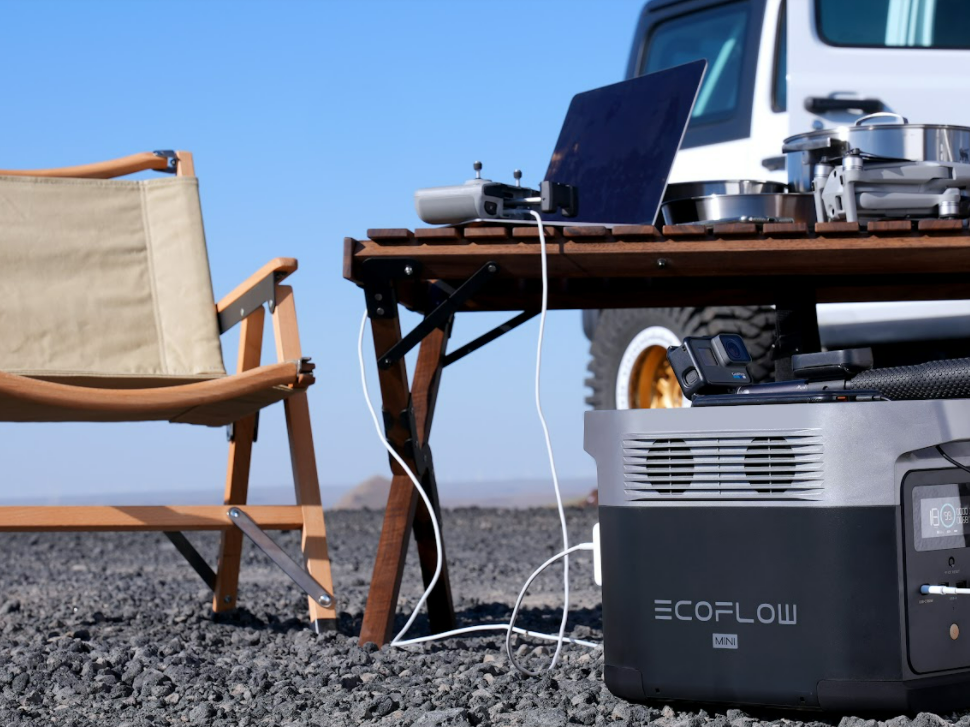It is smaller than the Ecoflow Delta Max I reviewed in October and lighter too at 23.6lbs, but it still packs a powerful punch. The Delta Mini has a lithium-ion battery and has an output of 1400W (which can be boosted to 1800W) is small and has an array of power options for your peripherals – and a variety of charging options. The Delta Mini has a capacity of 882Wh, which is impressive for a small unit. If you are unsure about the difference between Watts and Watt-hours, my ZDNet colleague David Gewirtz has done a deep dive on the Ecoflow Delta Max power station, explaining about Watt-hours and how the Delta Max copes with power outages. Along with the Delta Mini, there is a box containing three cables and a user guide. One cable has a cigarette charger port and an 11-75 DC port to plug into the Delta Mini, which can cope with 10A maximum current. There is also an MC4 cable to charge the Delta Mini from your solar panels into the same inlet port and a wall cable plug. There is also a DC5521 to DC5525 cable. At the input end of the Delta Mini, handily outlined in yellow hatches, there is a slider switch to charge the Mini either slowly or quickly. If you charge the unit using solar panels, you can grab up to 300W from your two 160W solar panels to charge your power station in around 3-6 hours. Alternatively, plug the charger into your wall socket, switch the slider to fast, which uses Ecoflow’s X-stream technology to grab up to 900W, which will charge the power station in under two hours. There is also a terminal so you can charge the battery whilst out on the road in your car. Charging from the wall with the switch set to slow will charge the power station at 200W. However, you can use Ecoflow’s app to customise how fast you would like to charge the unit. There are two AC sockets for output and a car output port – along with two DC5521 output ports which will charge at up to 3A maximum. There is also a button to switch the 12V power on or off. On the other end of the unit, an LED panel shows the input and output Wattage, the battery charge state, and the time remaining to either discharge the battery to charge it fully. There is a USB Type-C port rated at up to 100W, two USB A ports and a USB fast-charging port. Short press the power button to switch on the unit or to light up the LED panel, and then long press it to turn the power station off. In addition to showing the output and input power, the LED panel also has indicators for the battery failure warning, high and low-temperature warnings and the fan indicator. There are also indicators at the bottom showing which output is currently being used. If you want to power a device that uses more than 1800W, then you can use Ecoflow’s X-Boost technology, which is enabled by default in the unit. This enables you to power a 2200W max device whilst giving a rated output power of 1400W. This prevents operational failure of the unit due to overload. The X-Boost, when enabled, will switch itself on when the total power output required exceeds 1400W. You can switch it on and off using the Ecoflow app. When fully charged, the battery will last for a year before needing to be refreshed, and the battery can be recharged over 800 times before its maximum battery capacity dwindles to 80%. There is a range of protective features built-in to the Delta Mini, such as over-voltage and overload protection, over-temperature and short circuit protection and, low temperature, voltage and overcurrent protection. Ecoflow certainly seems to have covered everything. For me, the Ecoflow app seems an extra overlay that I do not need to add extra configuration options to manage the Delta Mini power station. There are settings to tweak output and monitor the power station remotely, but I found that the default settings were all that I needed – and I did not really need to monitor everything during a power cut. However, its ultra-customisable settings will appeal to anyone who likes to tinker and tune The only thing I don’t like about the Ecoflow Delta Mini is its handles. The Jackery range of power stations have a single handle on the top of the device, and the Bluetti AC50S power station has two handles that lift up from the top of the unit, which can be carried with one hand. The Ecoflow Delta Mini has handles on each end of the power station – which means you need two hands to heft the unit around. The other thing that, for me, would enhance the Delta Mini would be a wireless charging pad on the top of the unit. Currently, it only seems to be useful for standing a six-pack of cans on top of the unit, but inserting LED lights or wireless charging would make good use of this wasted space. All in all, however, for $999 the Ecoflow Delta Mini is a very handy power station that will provide enough grunt to power multiple devices for several hours when the power goes down. Keep it charged, and you can relax knowing that if something does go wrong and you lose power, then you can rest assured that it will keep all of your devices fully charged – and power your broadband router – so you are not so disconnected from the world during your next power outage.
